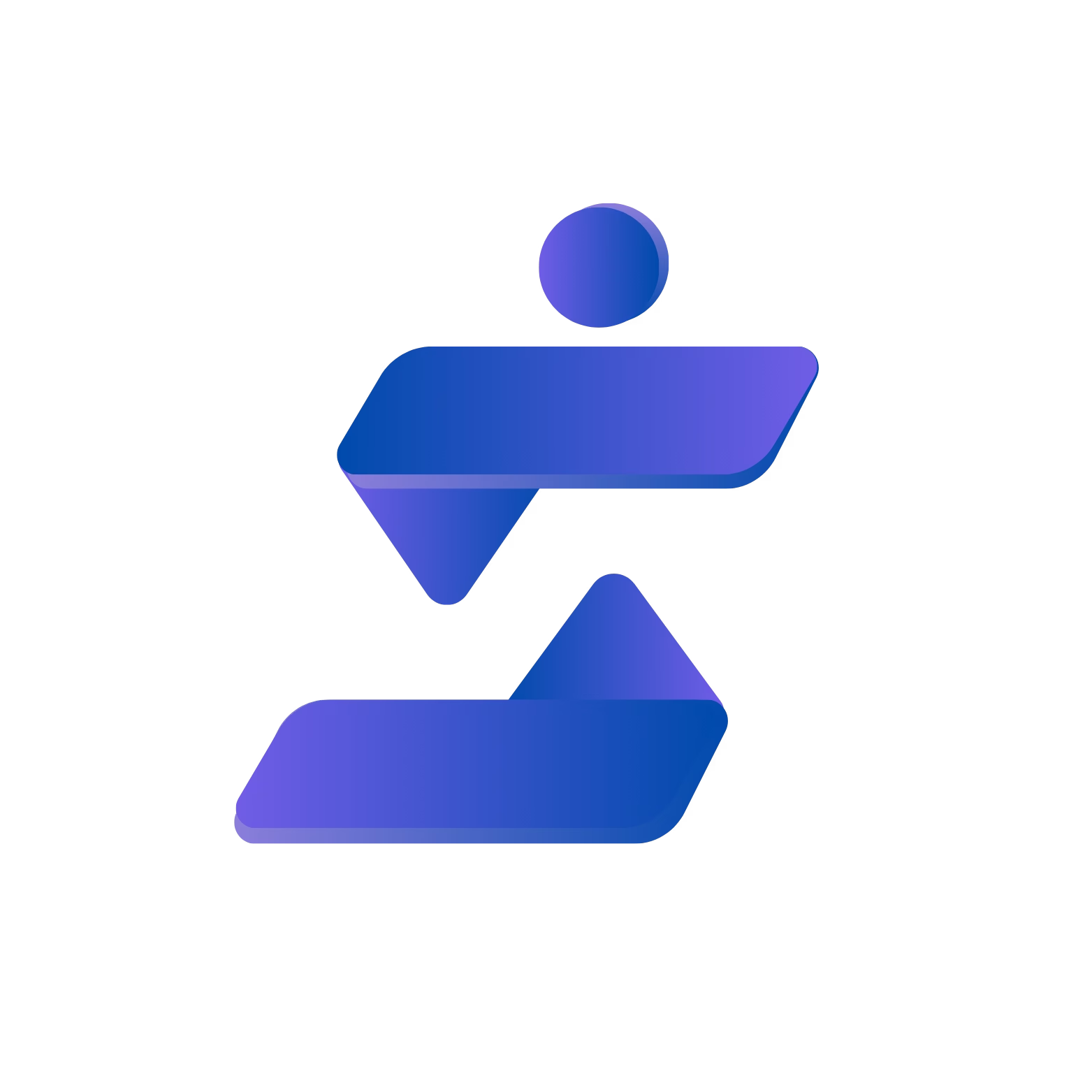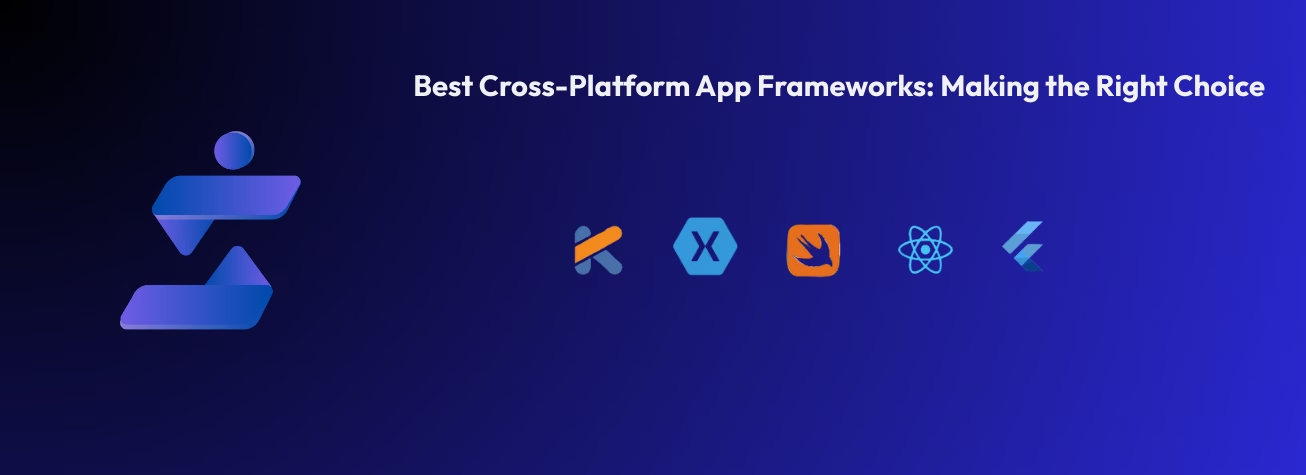
Author - Sisyphus
Guide to the Best Cross-Platform App Frameworks: Making the Right Choice
Conventionally, mobile app development has been a time-consuming and intricate endeavor. To accelerate this process and enhance efficiency, businesses are increasingly turning to cross-platform app development frameworks that offer greater flexibility and faster time-to-market.
Conventional app development often follows a linear sequence of steps that can lead to bottlenecks and errors, causing project delays and escalating expenses. Each phase—conceptualization, design, development, testing, and deployment—requires meticulous attention to detail, making it crucial to adopt tools that simplify these processes without compromising quality.
Selecting the right cross-platform framework allows companies to develop high-quality applications that work seamlessly across multiple operating systems. By maintaining a unified codebase for both iOS and Android, organizations can drastically cut down on redundant efforts, reduce maintenance overhead, and speed up updates and feature rollouts.
These modern frameworks empower businesses to stay competitive by delivering reliable, performant mobile apps quickly while optimizing resource allocation and reducing total development costs.
The Factors Fueling the Surge of Cross-Platform Development Frameworks in 2025
Creating separate native apps for iOS and Android demands a higher investment from businesses. This is due to the need to maintain two different codebases, employ multiple development teams, and put in double the effort for updates and feature releases. As a result, the mobile app development process becomes even more complex and resource-intensive.
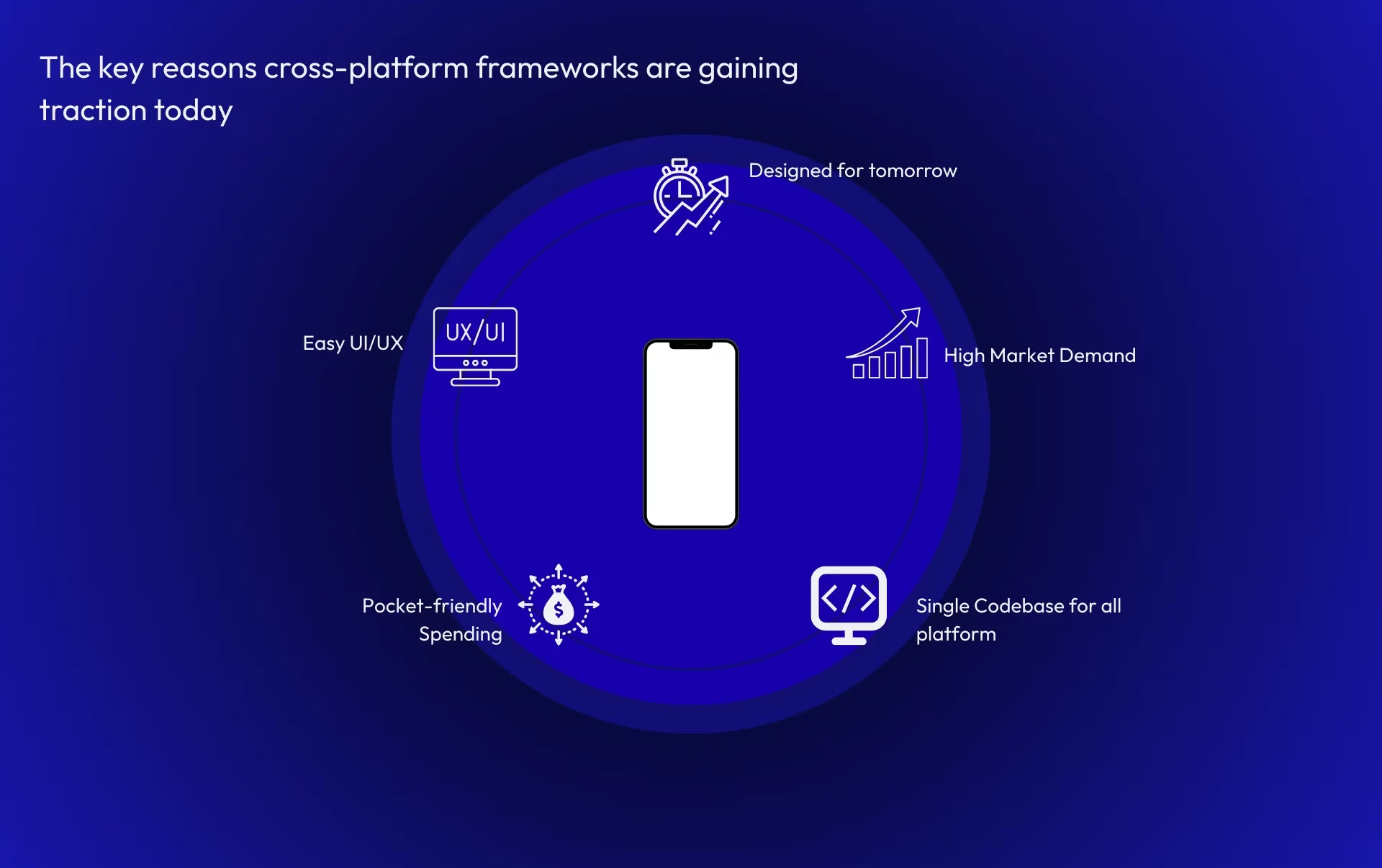
As a result, cross-platform mobile app development frameworks have gained traction by easing the workload on businesses in these ways:
Single Codebase for All Platforms
Write code once and deploy it everywhere. Using a shared codebase eliminates the necessity to create and maintain separate logic for each platform. Frameworks like Kotlin Multiplatform allow reuse of key components such as business logic and data management across various devices, reducing duplication and effort.
Accelerated Development and Faster Market Launch
Maintaining a single codebase accelerates development speed and can cut time-to-market by up to half. Features like Flutter’s Hot Reload and React Native’s Fast Refresh enable developers to see UI changes instantly, without needing to restart the app.
Cost Savings Through Efficient Resource Utilization
Managing distinct development teams for iOS and Android consumes substantial time and budget. With a unified codebase, a combined team can handle both platforms, optimizing technical resources and significantly lowering overall expenses.
Scalable Solutions & Versatile Platform Support
Today’s applications must perform seamlessly across mobile, web, desktop, and wearable devices. Cross-platform app development frameworks provide the versatility to support multiple platforms, establishing them as a forward-thinking option.
Uniform User Experience Across Devices
With solutions like Flutter’s Material and Cupertino widgets, there’s no need to question which framework fits best for iOS or Android - these widgets deliver a native-like look and feel on any operating system. Likewise, React Native facilitates smooth integration with native UI elements, ensuring users have a consistently high-quality experience regardless of the device.
Best 5 Cross-Platform App Development Frameworks
At present, Flutter and React Native stand out as the leading choices for cross-platform mobile app development, consistently dominating this space. Let’s explore in depth what features and capabilities are fueling their rising adoption, as more organizations seek scalable and economical mobile solutions to meet industry demands.
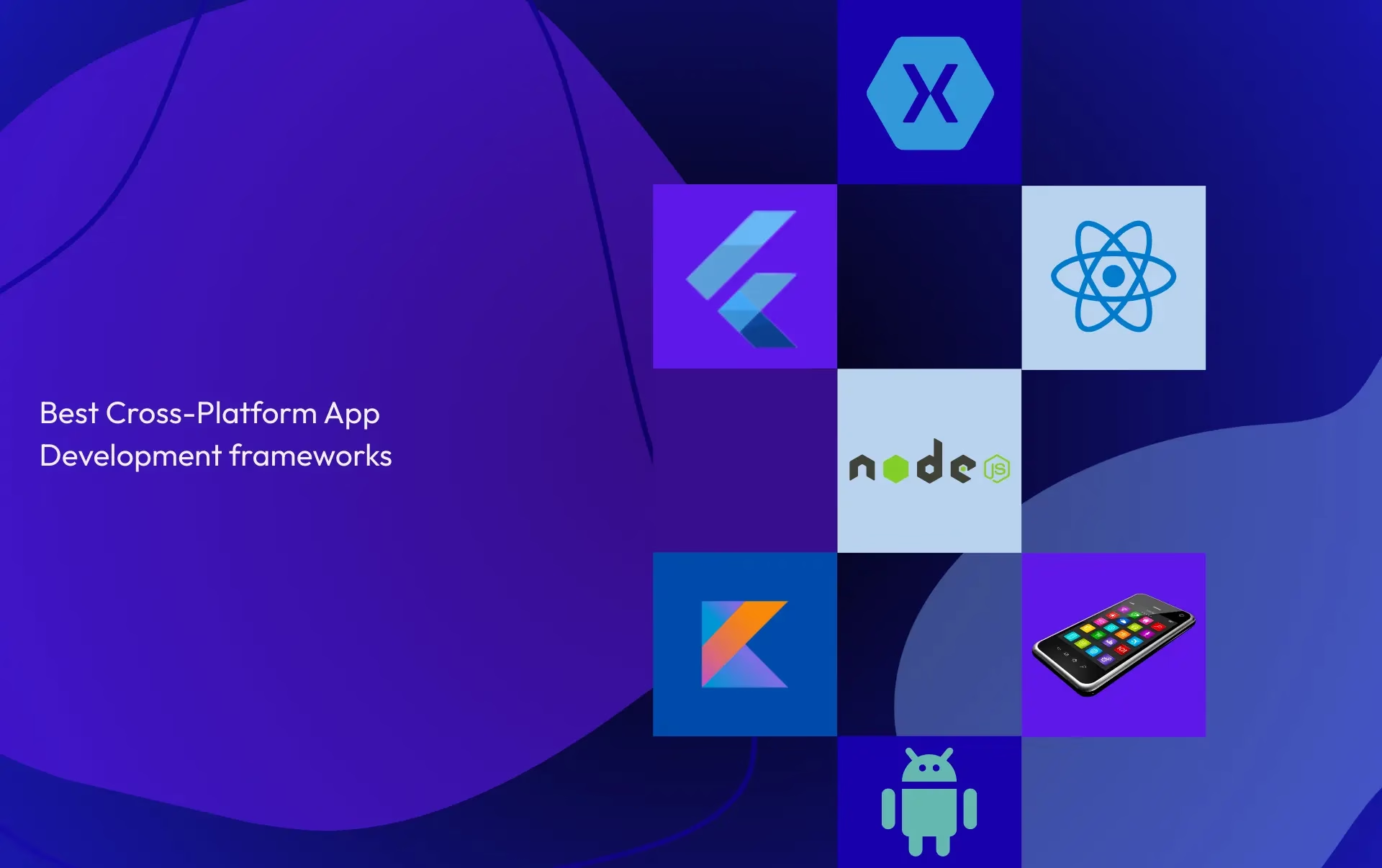
Flutter
Flutter proves highly effective for delivering an experience that closely mirrors native apps while developing for multiple platforms. It grants seamless access to essential device capabilities such as camera integration, location tracking, and local storage. For any device-specific feature not inherently supported, developers can utilize Platform Channels to implement custom, platform-targeted code.
Its flexibility has secured trust from 46% of developers globally, with leading companies such as Google Ads, Alibaba Xianyu, eBay Motors, and the Hamilton app opting for Flutter.
Reasons to Select Flutter:
Effortlessly reuse UI modules across different operating systems
Accelerate MVP (Minimum Viable Product) creation for fast testing and validation
Enhance speed and efficiency for applications demanding robust CPU/GPU capabilities
Key Advantages:
Enables instantaneous code updates with Hot Reload, streamlining development cycles
Delivers uniform interface elements through Material and Cupertino widget libraries, guaranteeing consistent appearances across devices
Utilizes a proprietary rendering engine for reliable, smooth cross-device performance
Supports a wide array of platforms, covering iOS, Android, web, and desktop systems
React Native
If you're focused on developing a lightweight and straightforward application, React Native is an excellent choice for building cross-platform apps.
Launched by Facebook in 2015, React Native is a free framework designed for creating hybrid mobile applications using JavaScript. Building on the foundation of ReactJS, it lets developers use the same codebase for both Android and iOS, while still providing users with an experience that feels native.
Reasons to Select React Native:
Easily incorporate a wide range of third-party UI libraries to accelerate development cycles.
Perfect fit for teams who are already skilled in JavaScript or React.
Key Advantages:
Fast Refresh enables real-time code modifications, streamlining the development workflow.
Native elements deliver polished user interfaces and robust user experiences.
Integrated debugging support with tools like Flipper makes troubleshooting more efficient.
The framework benefits from a vibrant developer community, offering regular updates and strong technical assistance.
Kotlin
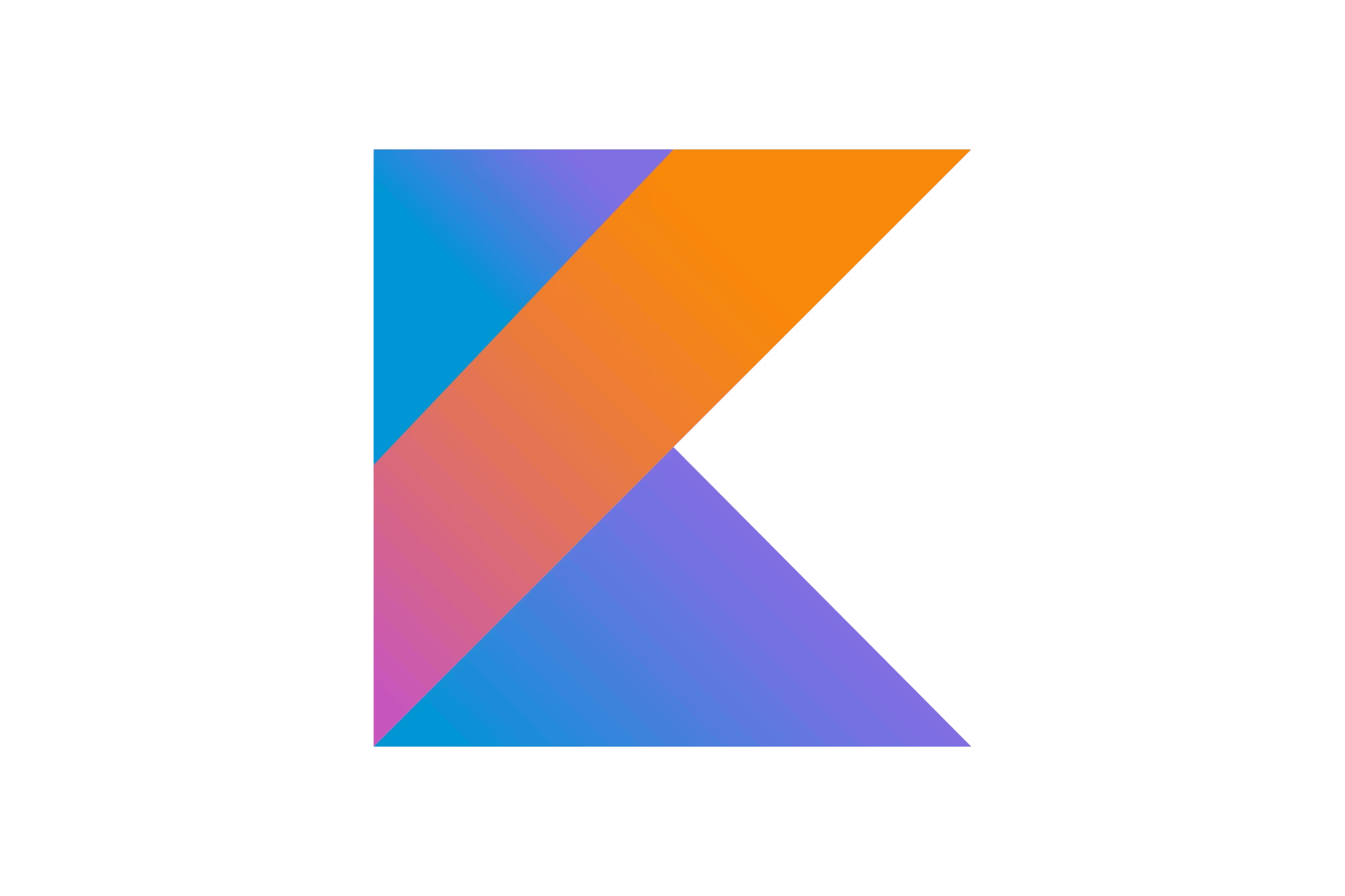
Kotlin stands out as a top choice for cross-platform app development when you want to share essential code while still delivering a native look and feel. Crafted by JetBrains, this tool lets you apply business logic to both Android and iOS, while giving you the option to work with each platform’s native UI frameworks for tailored user interfaces.
It blends effortlessly with existing projects and has been increasingly adopted by major apps like Netflix, Cash App, and VMware, highlighting both its versatility and reliability.
It blends effortlessly with existing projects and has been increasingly adopted by major apps like Netflix, Cash App, and VMware, highlighting both its versatility and reliability.
Reasons to Select Kotlin:
Transfer Kotlin code and expertise between mobile, web, desktop, and server applications
Build authentic native interfaces using each platform’s dedicated tools
Incorporates smoothly into current apps, so you avoid starting from scratch
Key Advantages:
Compose Multiplatform provides flexible options for sharing code and building UI
Gradle integration ensures easy builds and manages dependencies smoothly
Delivers a genuine native feel, leveraging Kotlin’s modern programming style
Compatible with pre-existing Android and iOS application codebases
Xamarin
Xamarin is a perfect fit for development teams with experience in .NET and C#, allowing up to 90% of your code to be reused - helping you speed up development cycles and simplify ongoing maintenance.
Thanks to direct integration with Visual Studio and the ability to interact with native APIs, Xamarin lets you achieve native-like visuals and functionality without having to build different codebases for each device. This makes it a trusted platform for major organizations like The World Bank, BBC Good Food, Alaska Airlines, and FreshDirect.
Reasons to Select Xamarin:
Delivers authentic UI and performance by leveraging platform-specific APIs
Efficient development thanks to advanced Visual Studio tools
Ready-made features for RESTful APIs, cloud solutions, and backend connectivity
Key Advantages:
Wide-ranging .NET libraries and broad plugin support
Mitigates hardware compatibility concerns through customized platform plugins
Robust compile-time validation helps catch errors early and improves stability
Node.js
Node.js is a free, cross-platform runtime that operates on the Chrome V8 JavaScript engine. Renowned for its speed and ability to scale, it’s a top choice for building server-side software and robust networking solutions.
Leading companies such as PayPal, LinkedIn, and Walmart rely on Node.js, empowering developers to build high-performance, scalable, and efficient apps.
Reasons to Select Node.js:
Efficiently manages numerous simultaneous connections
Uses asynchronous, non-blocking APIs for enhanced speed and responsiveness
Perfect for applications processing real-time or heavy data flows
Utilizes a single-threaded event loop, which makes scaling backend operations simpler
Key Advantages:
Asynchronous and non-blocking I/O delivers great performance with multiple concurrent connections
Chrome’s V8 engine provides rapid code execution
Data streaming in chunks boosts efficiency and minimizes the need for buffering
The single-threaded event loop design allows Node.js to handle many requests at once with minimal resource requirements
What's Next
As the top cross-platform app development frameworks continue to advance and vie for market leadership, it will be fascinating to observe how they measure up against new and emerging technologies. Companies aiming to maintain a competitive edge should leverage expert cross-platform development platforms to guarantee their applications offer smooth functionality and a cohesive, engaging user experience across all devices.
With the right skills and guidance, businesses can elevate their mobile offerings to satisfy both present and future requirements.
For further information or assistance, feel free to email us at official@sisyphusinfotech.com or call +91-90381-30595.


